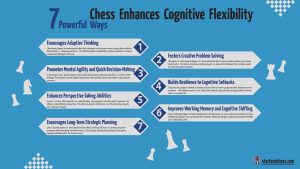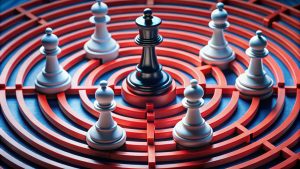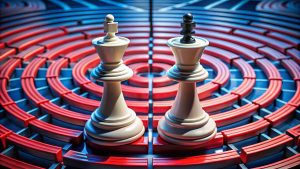7 Powerful Ways Chess Enhances Cognitive Flexibility
Chess is not only a game of strategy and intellect, but it also serves as a powerful tool for mental agility. One of the most significant ways it benefits the mind is by enhancing cognitive flexibility—the ability to adapt your thinking in response to new information or changing situations.
As players face different scenarios on the chessboard, they are constantly required to shift their strategies and think on their feet, which exercises the brain’s capacity for flexible thinking. This skill is crucial in everyday life, helping individuals tackle challenges, solve problems creatively, and make better decisions under pressure.
Chess enhances cognitive flexibility by encouraging players to evaluate multiple perspectives, adjust to unexpected moves, and refine their plans as new developments arise. This dynamic mental process strengthens the brain’s ability to switch between different thought patterns and approaches, fostering greater mental adaptability.
When it comes to cognitive development, playing chess is a well-rounded mental exercise. Whether you’re managing a complex endgame or responding to your opponent’s unexpected move, chess pushes you to think in new ways, fostering adaptability and mental agility.
In this article, we’ll explore seven powerful ways chess enhances cognitive flexibility, from promoting creative problem-solving to improving working memory and resilience.
- What is cognitive flexibility, and why is it important?Cognitive flexibility is the brain's ability to adapt and shift between different thoughts or strategies in response to changing situations. It is important because it allows individuals to think creatively, solve problems efficiently, and adjust to new challenges, making them more resilient and effective in decision-making.
- How does playing chess enhance cognitive flexibility?Chess enhances cognitive flexibility by constantly challenging players to adapt their strategies based on their opponent’s moves. The game improves adaptive thinking, problem-solving, mental agility, and perspective-taking, all of which contribute to better cognitive flexibility.
- How does chess improve working memory?Chess requires players to remember past moves, anticipate future moves, and adjust strategies on the fly, all of which strengthen working memory. The ability to hold and manipulate information while considering multiple scenarios enhances cognitive flexibility.

-
Encourages Adaptive Thinking
The game of chess changes every moment; sometimes it calls for one or another reassessment of a position that needs to be made and, correspondingly, changing the strategy. Every move shifts the whole dynamic, so players have to think on their feet and adapt to an ever-changing board. It is this adaptability forming part of cognitive flexibility, and enabling an individual to shift their mindset in approach when new challenges arise.
Life requires one to adapt to problems that need decisions to be made. Playing chess regularly helps an individual to gain mental flexibility, whereby the player changes direction quickly in a situation that happens to be uncertain. This helps the person navigate even in a complicated environment with respect to making wiser, calculated decisions outside of the game.
-
Fosters Creative Problem-Solving
Chess involves solving big problems with unique and uncommon solutions, especially when players find themselves in difficult positions. The game is creative, for it demands the anticipation of possibilities and methods to outmaneuver opponents. This process of exploring different options cultivates innovation and lateral thinking.
The creativity developed with chess can then be used in real-world situations. At work or even in daily life, a chess player can often view problems from different angles, enabling the person to find better solutions to complex problems creatively.
-
Promotes Mental Agility and Quick Decision-Making
For instance, in blitz chess, players have to make decisions on the moves in less than a few seconds. Such pressure develops one’s mental quickness-the player has to weigh options in seconds and selects the best action. Chess players learn to trust their intuition while making quick, accurate decisions.
This edginess in thinking and acting fast gives an edge taken over from chess even into life. Whether it is a decision one has to make at the spur of a moment on the job or finding a solution to a problem under much stress, chess trains the brain to handle multiple factors quickly, helping individuals keep their cool and become effective even under high-pressure situations.
-
Builds Resilience to Cognitive Setbacks
It is part of the game to make mistakes and incur losses, but every failure is an opportunity to learn and grow. Chess helps players learn to get up after they have made mistakes and to reassess where they went wrong with their strategic moves. This helps to strengthen their resilience. Instead of dwelling on failure, chess players learn how to adapt and build on those experiences to perfect their craft.
This resilience carries over into real life. People learn to accept mistakes as part of the process. Thus, when adversity hits them in real life, they can be quite agile. They recover and move on, adjust, and continue, both with chess and with life.

Explore the full range of topics on chess and personal growth at [startend chess]
-
Enhances Perspective-Taking Abilities
To play chess effectively, one needs to be informed about the opponent’s strategy. That involves perspective-taking: it requires one to step into another person’s shoes and try to predict their moves. With this kind of practice, chess players will develop an acute sense of empathy and foresight-important elements of cognitive flexibility.
This is important in life, given that solving a problem from many points of view can always come in handy. Whether it is at your workplace when finding solutions to problems at hand with colleagues or in social situations, seeing things from another’s perspective often saves the day and leads to better outcomes, and sometimes even better relations.
-
Improves Working Memory and Cognitive Shifting
In the case of Chess, it demands holding on and processing a number of pieces of information simultaneously, remembering previous moves, anticipating future moves, and adjusting to current ones. The reliance on the working memory will strengthen this ability of the brain in dealing with complicated information without losing its grip on the big picture.
Another important ability developed in chess is cognitive shifting, which is the ability to switch between various mental tasks. With the strategy that keeps on switching and changing in any game, it cultivates mental flexibility, therefore enhancing one’s multitasking abilities at work or in personal affairs.
-
Encourages Long-Term Strategic Planning
Chess is a game of foresight: players have to balance short-term tactics with long-term strategies. Success at chess is dependent upon thinking several moves in advance, thus visualizing what will occur in the future and adjusting plans accordingly. This allows for long-term strategic thinking to be developed through a planning process.
This is the ability to be a strategic thinker that prevails in many areas of life, from career planning to project management. Chess trains the brain to think big and encourages setting goals, plus making decisions that mirror one’s long-term vision.

Conclusion
Chess is far more than a simple board game; it’s a mental workout that significantly enhances cognitive flexibility. Each move challenges players to adapt, think creatively, and shift strategies based on constantly evolving circumstances. By engaging in chess regularly, you can train your brain to become more agile and responsive in both complex and everyday situations. The skills you develop—such as adaptive thinking, mental agility, and perspective-taking—are invaluable in helping you approach life’s challenges with confidence and creativity.
Whether you’re a beginner or an experienced player, incorporating chess into your routine can sharpen your mind in ways you may not expect. From improving working memory to boosting resilience, chess enhances cognitive flexibility, making you better equipped to navigate unpredictable environments and solve problems efficiently. Start playing chess today, and unlock your brain’s full potential for flexible, strategic thinking.
If you’re interested in diving deeper into this topic, we’ve prepared a podcast just for you. Feel free to listen and explore more insights:
References:
- Sala, P., Gobet, F., Trinchero, R., & Ventura, M. (2017). “The impact of chess instruction on the academic achievement of children: A meta-analysis.” Educational Research Review, 22, 65-82.
- Burgoyne, A. P., et al. (2019). “Chess and cognitive skills: Evidence from a randomized controlled trial.” Educational Psychology, 39(1), 82-95.
- Miller, E. (2014). “The Effects of Chess Instruction on the Academic Performance of Students.” International Journal of Instruction, 7(1), 117-136.
- McPherson, S. (2010). “Chess and Cognitive Function: A Review of the Literature.” Cognitive Science, 34(5), 978-999.
- O’Boyle, J. D., & McDonald, D. (2013). “The role of working memory in chess.” Psychological Science, 24(5), 855-860.
- Albert Einstein College of Medicine. (2012). “Mentally engaging activities, including chess, can help reduce dementia risk.”
- Berg, K. A., & Wendel, J. (2018). “Chess and the Brain: How Playing Chess Can Improve Cognitive Skills.” Neuroscience & Biobehavioral Reviews, 92, 162-173.
Recommended Articles:
- A Beginner’s Guide to Playing Chess: Basic Rules and Tips to Get You Started
- 6 Chess Tricks to Win Fast: Success Tips for Amateurs



0 Comments